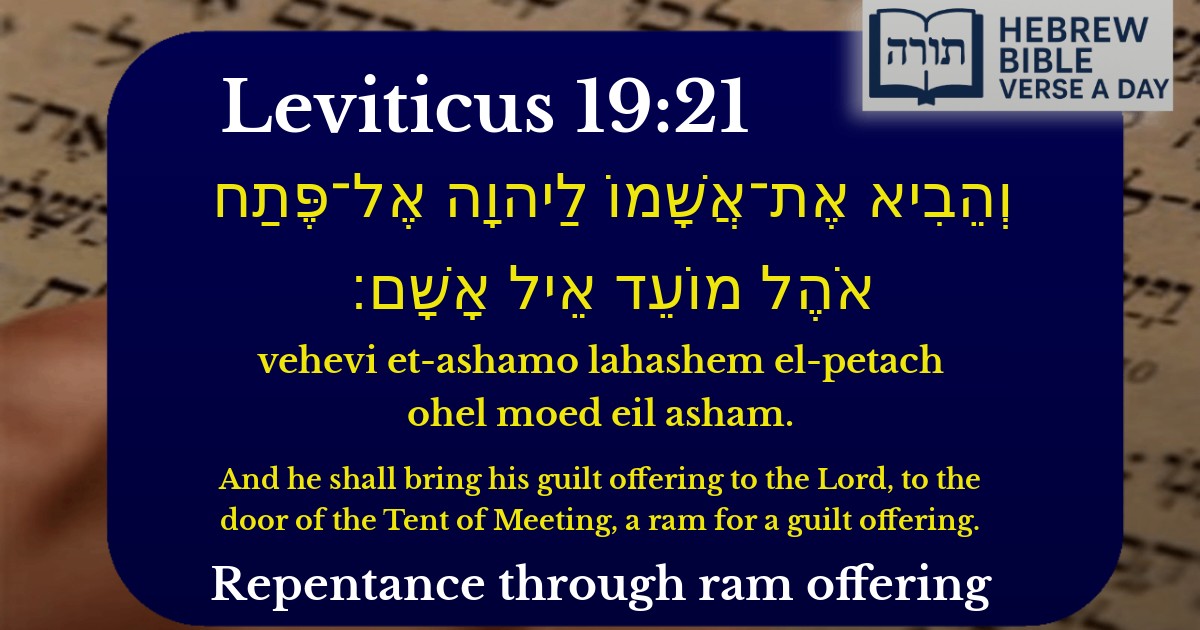Join Our Newsletter To Be Informed When New Videos Are Posted
Join the thousands of fellow Studends who rely on our videos to learn how to read the bible in Hebrew for free!
Hebrew Text
וְהֵבִיא אֶת־אֲשָׁמוֹ לַיהוָה אֶל־פֶּתַח אֹהֶל מוֹעֵד אֵיל אָשָׁם׃
English Translation
And he shall bring his guilt offering to the Lord, to the door of the Tent of Meeting, a ram for a guilt offering.
Transliteration
Vehevi et-ashamo lahashem el-petach ohel moed eil asham.
Hebrew Leining Text
וְהֵבִ֤יא אֶת־אֲשָׁמוֹ֙ לַֽיהֹוָ֔ה אֶל־פֶּ֖תַח אֹ֣הֶל מוֹעֵ֑ד אֵ֖יל אָשָֽׁם׃
וְהֵבִ֤יא אֶת־אֲשָׁמוֹ֙ לַֽיהֹוָ֔ה אֶל־פֶּ֖תַח אֹ֣הֶל מוֹעֵ֑ד אֵ֖יל אָשָֽׁם׃
🎵 Listen to leining
Parasha Commentary
📚 Talmud Citations
This verse is quoted in the Talmud.
📖 Zevachim 5b
The verse is cited in a discussion about the proper place for bringing guilt offerings and other sacrifices, emphasizing the requirement to bring them to the entrance of the Tent of Meeting.
📖 Menachot 92a
Referenced in the context of discussing the various types of offerings and their specific requirements, including the location where they must be brought.


Verse Context
The verse (Vayikra 5:15) discusses the requirement to bring a guilt offering (asham) for certain transgressions, particularly those involving misuse of sanctified property (me'ilah). The offering must be brought to the entrance of the Tent of Meeting (Ohel Moed), emphasizing the need for atonement in the presence of Hashem.
Rashi's Explanation
Rashi (Vayikra 5:15) clarifies that the guilt offering must be a ram (eil asham), distinguishing it from other types of sacrifices. He notes that the phrase "to the Lord" underscores that the offering must be brought with proper intent (lishmah) for atonement, not merely as a ritual act.
Rambam's Perspective
In Hilchot Me'ilah (8:8), Rambam explains that the guilt offering serves as both atonement and restitution for misusing sanctified items. The requirement to bring it to the entrance of the Tent of Meeting symbolizes the sinner's return to closeness with Hashem after repentance.
Midrashic Insights
Halachic Implications
The Talmud (Zevachim 5a) discusses the precise location where the offering must be slaughtered—near the entrance—to ensure proper handling by the Kohanim. This reflects the importance of adhering to halachic details in the sacrificial process.